After the visit
“Let us take the first step” was the motto of the apostolic journey. The Pope indicated and undertook the path together with the Colombian people. Those of us who followed him closely had the clear feeling that there will be a “before” and an “after” marked by the Pope’s visit, for the good of Colombian society
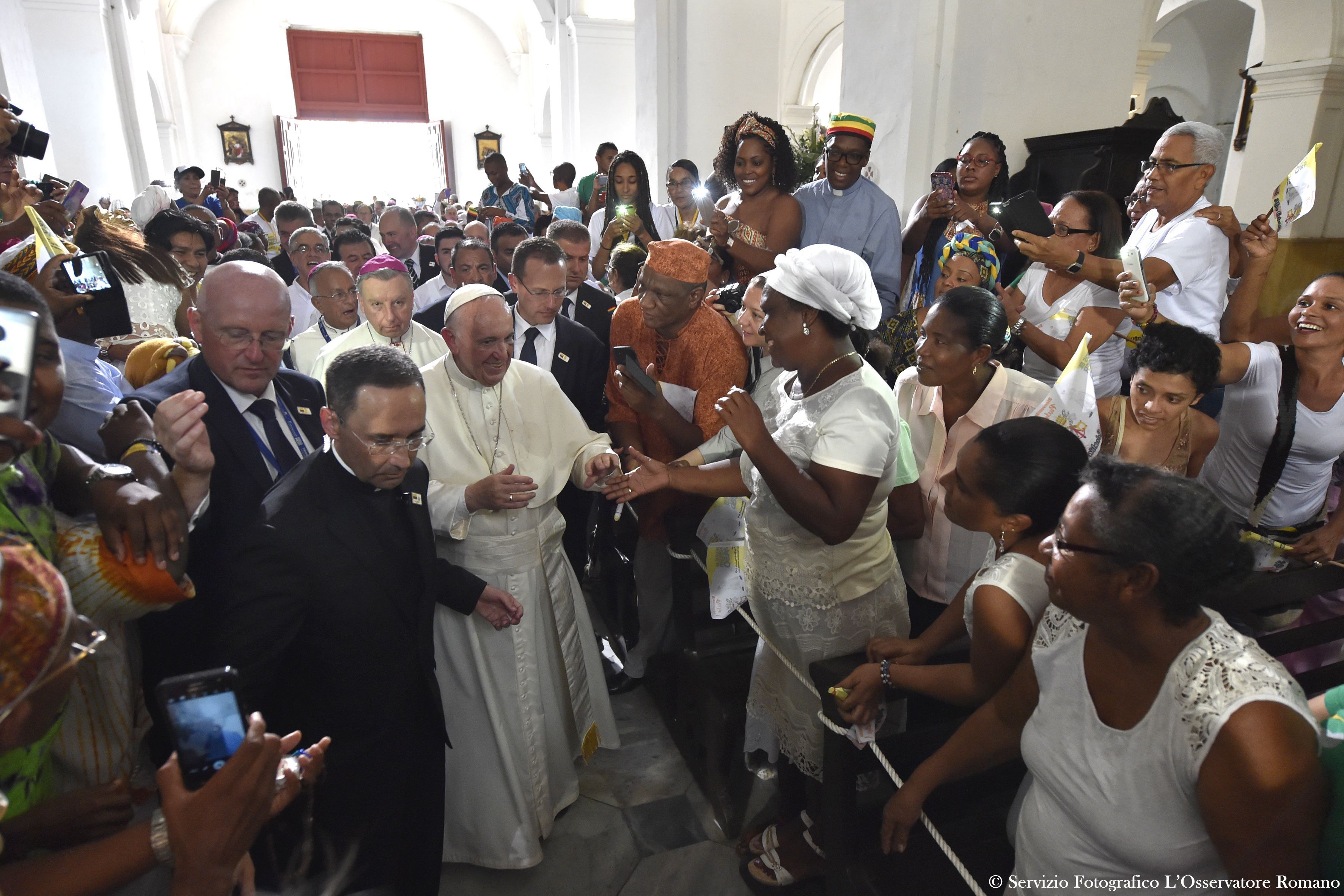
“Colombia, open your heart as the People of God and be reconciled. Fear neither the truth nor justice. Dear people of Colombia: do not be afraid of asking for forgiveness and offering it. Do not resist that reconciliation which allows you to draw near and encounter one another as brothers and sisters, and surmount enmity. Now is the time to heal wounds, to build bridges, to overcome differences. It is time to defuse hatred, to renounce vengeance, and to open yourselves to a coexistence founded on justice, truth, and the creation of a genuine culture of fraternal encounter.” Perhaps this urgent appeal of the Pope during the prayer meeting for national reconciliation in Villavicencio, is only an introduction to what we experienced during his visit as universal Shepherd. I use the words “perhaps” and “only” because while on the one side all his allocutions and homilies were marked by significant depth and richness – and thus nothing can replace their attentive, enlightening reading – , on the other, these messages , deeply related to the present circumstances of the life of the Colombian people, are set within the framework of an event with such a remarkable degree of humane and Christian bearing that no report, however exhaustive, can ever convey.
The Pope embraces the social fabric of Colombia, he plunges into it with the words of the Gospel and expressive love, while at the same time he speaks for all Latin America, for the entire Catholic realm.
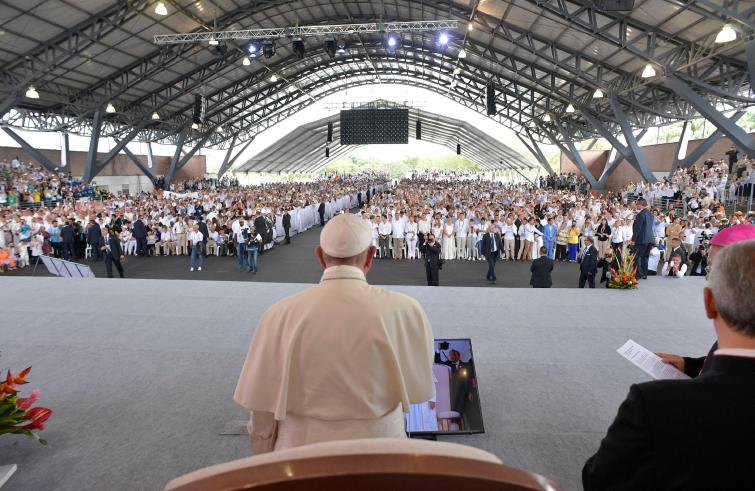
Colombia is a wonderful Country; it is fascinating in that it is utterly exuberant: its geography, its nature prodigal of “unimaginable fruitfulness” and biodiversity, the variety and expressiveness of its people and cultures along with its many contradictions: the culture of death and “its indomitable courage in resisting threats of death”, along with its deep-rooted Christianity present in the life of the people afflicted by grave clashes and by the wounds of human sin. “I am convinced that Colombia has one remarkable feature: it has never been a goal fully attained, a destiny completely achieved, or a treasure totally possessed.” The fountainhead of the magical realism of Gabriel García Márquez lies in these exuberant expressions and excesses, that is why Pope Francis mentioned him, not only for reasons of national pride, but also inasmuch as he is the expressive genius of Colombia’s deepest roots.

The Holy Father follows the same advice he shared with the Columbian people, namely, “not to withdraw from the concrete historical realities” which they were born into: “the recent, living memory of your people which is marked by tragic events, but also filled with heroic acts, great humanity, and the noble spiritual values of faith and hope.” It is a story lived and suffered in a land “watered by the blood of thousands of innocent victims and by the heart-breaking sorrow of their families and friends (…).Wounds that are hard to heal (…).” And above all they are “stories of not letting hatred, vengeance or pain take control of our hearts(…). The solitude of always being opposed to one another has lasted decades, and seems to be centuries old.”
Some have counted as many as over eight million victims in the span of six decades – including those killed in armed strife, wounded and mutilated, abducted, tortured, raped women and civilians blown-up by anti-personnel mines , along with the displaced persons who fled their lands for reasons of violence and fear, refugees, broken families, orphaned and abandoned children.
“He did not realize that it is easier to begin a war than to end one”, the Pope said quoting from Gabriel García Márquez’ “One hundred years of solitude”. Francis knew he was visiting Colombia at a very special moment in its history, in full appreciation of the efforts made in the past decades to put an end to armed violence and find paths of reconciliation, and above all, in view of “the important steps made over the past year.” It was not necessary to explicitly refer to the “peace agreements”, although they were inferred. The Pope preferred to highlight “the efforts to build the unity of the nation, despite obstacles, differences and varying perspectives on the way to achieve peaceful coexistence,” and to persevere “in the struggle to promote a culture of encounter. This requires us to place at the centre of all political, social and economic activity the human person, who enjoys the highest dignity, and respect for the common good.” “The satisfaction of short-term partisan interests must not prevail.”
Polarizations and specific political ambitions are not an appropriate path for the huge enterprise of pacification. Nor can this undertaking be reduced to tackling the oligarchies that have been holding the reins of power for the past decades.
“This is not achieved simply with those of “pure blood” – the Pope said – but by all. And here lies the greatness and beauty of a country, where all fit in and where all are important.” Peace is not achieved “by normative frameworks and institutional arrangements between well-intentioned political or economic groups.” It is always helpful, “to incorporate into our peace processes the experience of those sectors that have often been overlooked, so that communities themselves can influence the development of collective memory”, the Pope said in Cartagena. The Pope thus proceeded to highlight the passage of the Apostolic Exhortation Evangelii Gaudium whereby “the principal author, the historic subject of this process, is the people as a whole and their culture, and not a single class, minority, group or elite. We do not need plans drawn up by a few for the few, or an enlightened or outspoken minority which claims to speak for everyone. It is about agreeing to live together, a social and cultural pact.”

“The deep-rooted shared wisdom that is the basis of every reality in Latin America”, that very “reserve of moral values on which the life of the continent rests” and “this rich soil present in the heart of our people, (…) is the unseen yet essential foundation” of any “lasting construction.” Pope Francis firmly believes that it is necessary “to speak to this hidden heart. For it guards, like a small spark beneath a coat of ashes, the sense of God and of his transcendence, a recognition of the sacredness of life, respect for creation, bonds of human solidarity, the sheer joy of living, the ability to find happiness without conditions. Such is the popular piety of our people”, and “Guadalupe and Aparecida are programmatic signs of the divine creativity that has bought this about.”
It is necessary to reach out to this deep-rooted soul of Latin America to induce people to become active builders of peace and justice.
That is why, the Pope pointed out, “Our people have learned that no disappointment can crush it. It follows Christ in his meekness, even under the scourge. It knows how to rest and wait for the dawn, trusting in victory, because – deep down – it knows that it does not belong completely to this world.”
During the entire visit, addressing the heart of Colombian people, and taking a further step towards his peace-building process, the Holy Father appealed “to look to all those who today are excluded and marginalised.”
How can peace be built when 50% of Colombians live below the poverty line? Is it not true that poverty and severe inequalities constitute situations and causes of violence per se? Here we find the deep-rooted, suffering part of Colombia that needs to be “discovered.”
The Pope addressed all Columbians, as he visited one of the poorest districts of Cartagena, known as the city with the most severe situations of social inequality in the Country. What most hurts our soul is the suffering of children – children of torn families, orphaned by violence, abandoned children – whom the Pope embraced during his visit for the extraordinary experience of “Hogar de San José” – the Home of Saint Joseph – in Medellín.
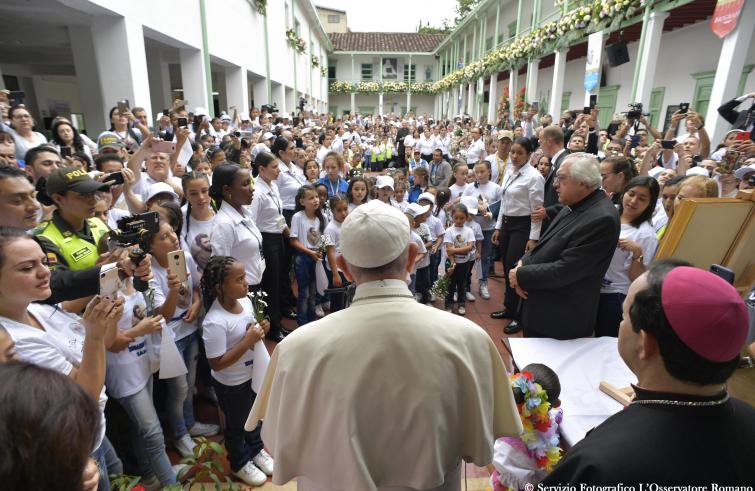
A major historical challenge – clearly reiterated by the Pope in Colombia – is to overcome the “thick darkness which threatens and destroys life: the darkness of injustice and social inequality; the corrupting darkness of personal and group interests that consume in a selfish and uncontrolled way what is destined for the good of all; the darkness of disrespect for human life which daily destroys the life of many innocents, whose blood cries out to heaven; the darkness of thirst for vengeance and the hatred which stains the hands of those who would right wrongs on their own authority; the darkness of those who become numb to the pain of so many victims.” To this is added the “moral metastasis” that “under the spell of drugs” peddles hellfire, “sows rampant corruption and creates fiscal paradises.” “The violence present in our hearts, wounded by sin – the Pope added extending his gaze to Villavicencio, towards the horizon of the Amazon forest – is also reflected in the symptoms of sickness evident in the soil, in the water, in the air and in all forms of life.” And thus the human, social and natural ecology of coexistence remains contaminated.
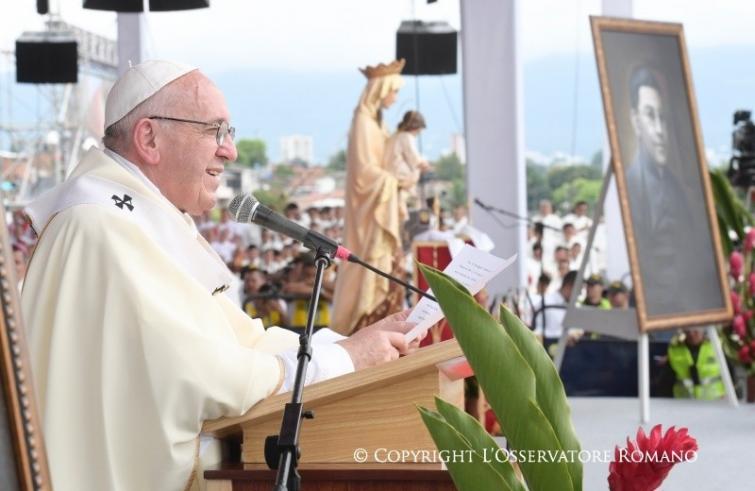
“Deep historic wounds – the Pope concluded in Cartagena – necessarily require moments where justice is done, where victims are given the opportunity to know the truth, where damage is adequately repaired and clear commitments are made to avoid repeating those crimes. But that is only the beginning of the Christian response. We Christians are required to generate “from below”, to generate a change in culture: to respond to the culture of death and violence with the culture of life and encounter.” The Church “must work tirelessly to build bridges, to tear down walls, to integrate diversity, to promote the culture of encounter and dialogue, to teach forgiveness and reconciliation, the sense of justice, the rejection of violence”, the Pope said addressing 60 bishops of Latin American Countries representing the executive committee of CELAM. This can be done “if we fill our history of sin, violence and rejection with the light of the Gospel”, if we recognize that “the Lord takes the first step” in the history of salvation, in human life and in the life of His people, and thus “the encounter with the living Christ is always the fountainhead of everything.” We must return to “draw close to Jesus”, in the exercise of prayer, to become his veritable missionaries and disciples. “Otherwise, the face of the Lord is obscured, the mission is weakened, pastoral conversion falters.”
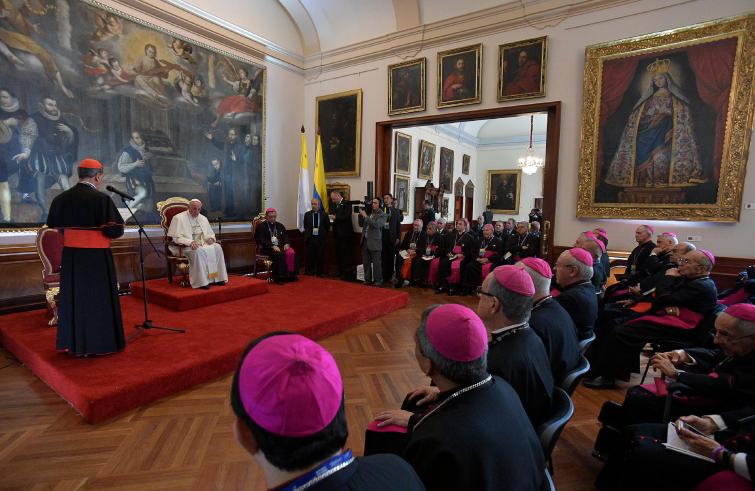
Pope Francis highlighted the beautiful words of Aparecida: “Knowing Jesus is the best gift that any person can receive; that we have encountered him is the best thing that has happened in our lives, and making him known by our word and deeds is our joy” (Aparecida Document, 29). Speaking to the Colombian bishops gathered in Bogotá, the Pope underlined: “Christ is the word of reconciliation written on your hearts. You have the power to preach that word not only in pulpits, in ecclesial documents or newspaper articles, but also in the hearts of individual men and women. You have the power to proclaim it in the inner sanctum of their consciences, where they hope to hear the heavenly voice that proclaims: “Peace to those whom God loves” (Lk 2:14)… The Church seeks only the freedom to speak that word… She has no need for alliances with this or that party, but only the freedom to speak to the heart of every man and woman.” Reconciliation is not a form of do-gooder irenism that “cannot serve to adapt to situations of injustice.”
It is a momentous word that can usher in a “change of course.” This is how it was lived and shared in the extraordinary meeting of reconciliation between the victims and the executioners in Villavicencio.
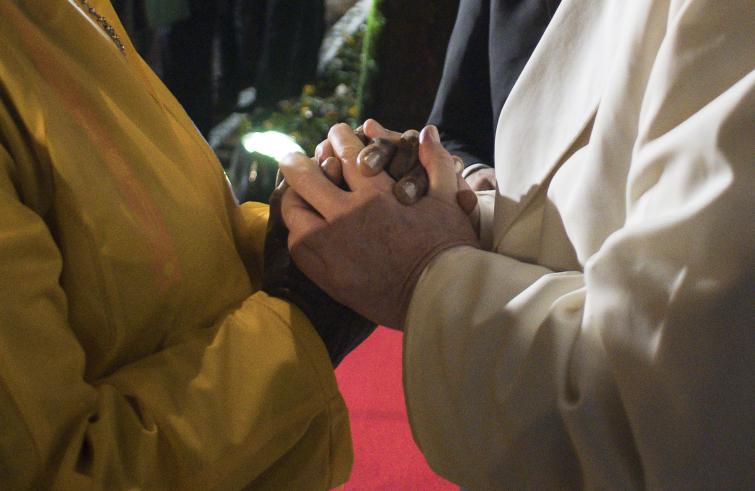
That same evening, before the entrance of the Apostolic Nunciature of Bogotá, that again brought together the victims and the executioners, we listened to two testimonies that could be described as an epicentre of dramatic beauty. The first is the testimony of an Afro-American woman whose husband and their three children were killed in the explosion of an oil pipeline caused by ELN guerrilla fighters. She said that after many years she still cannot forgive them but asked God to give her the grace of forgiveness, in the awareness that God forgives but she can bear witness to His forgiveness through her suffering. “It is a highly theological lesson”, the Pope replied. Another woman is a member of the association “Hospital de Campaña” (field hospital), that gives counsel to the victims and to repented executioners also with spiritual retreats.
The evangelical addresses of the Successor of Peter reverberated so strongly in a people with a deep-rooted Catholic tradition!
“May peace descend on this home”; “Peace be with you.”, “Christ is our peace! He has reconciled us with God and with one another!”, the Pope exclaimed in his address to Colombian bishops (…).he came to suffer for his people and with his people. He came to show us that hatred does not have the last word, that love is stronger than death and violence. He teaches us to transform pain into a source of life and resurrection, so that, with him, we may learn the power of forgiveness, the grandeur of love.” With the Risen Christ “no wall is eternal, no fear is indestructible, no plague is incurable.”
A lot is asked of the Colombian Church. She has to live up to the mission entrusted to her by God in the present circumstances of the life of the people. She cannot be content nor adapt herself to habits, to lifestyle and to the pace of what remains of Colombian traditional Christianity.
The fruitful maternity of the Church, body of Christ, for the grace of the Spirit of all-merciful God, must be, the Pope said, “a womb of light, capable of giving birth, even amid great poverty, to the new children that this land needs.” She should express her maternity “in begetting, nourishing and accompanying her children”, strengthening “her commitment in the formation of missionary-disciples.” He called upon the bishops to be “guardians and sacrament of the ‘first step’ of God who embraces us with his merciful love, mendicants of his grace in the prayer. He asked them to “touch the flesh of Christ’s body” in the suffering of His people, and exhorted them to “to preach the Gospel of joy today, tomorrow and the day following”, as they are “ministers of reconciliation.” He entrusted them the priests who are in the “frontline”, inviting them to ask: “Are they truly living as Jesus’ disciples?”; to “keep leading them to that Caesarea Philippi where each of them, from his own Jordan experience, can hear Jesus ask once more: Who do you say that I am?”. Most of all, they need to feel the close presence of the “paternal heart of the bishop.”
There is need for consecrated religious who “represent an evangelical rebuke to worldliness” and “hear in them the Bride’s cry of consecrated love: “Come, Lord Jesus” (Rev 22:20).
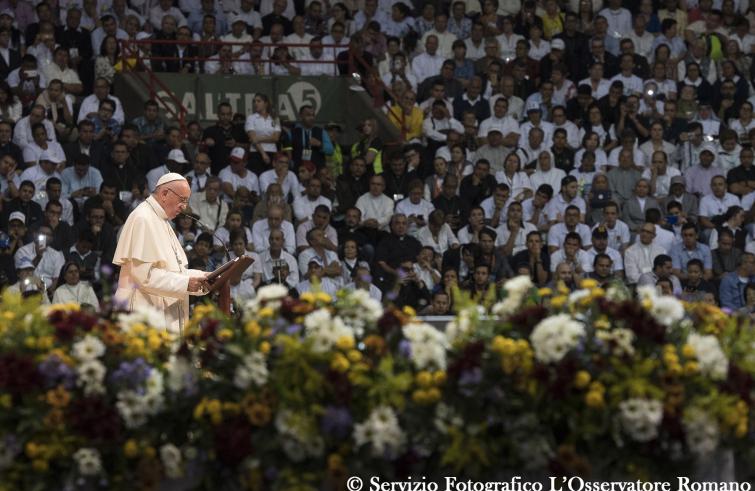
The Pope knows the truth and the beauty of spousal and family love, as he knows that the protection of the sacred gift of life, from conception to natural death, is an essential question in moral regeneration and for the Christian fabric of Colombian society.
He is fully aware that “in Latin America hope has a young face” – do not let yourselves be stripped of hope and joy! -, “it has a woman’s face” – often the heroic face of many woman who are the pillars in the erection of their families, of society and of the Church -, “it is present in hearts, minds and actions of the laity”, may them pave the way to the Gospel in the building of a new society. This hope is welcomed and nurtured “with the eyes of the poor and from the situation of the poor.”
With them is the witness of Saint Peter of Claver – “slave of blacks and slave forever”, of Saint Laura Montoya – who devoted her life to serving indigenous populations – of bishop Emilio Jesús Jaramillo Monsalve and Father Pedro Maria Ramirez Ramos, killed, proclaimed martyrs and beatified by Pope Francis in Villavicencio, as the role models of this new humanity who support their sisters and brothers in their path of faith, for the good of Colombia.
After hi first day in Bogotá and his return and overnight stay in the same Colombian capital over the next few days, Pope Francis decided to greet them, headed to Cartagena, proceeding with the “Popemobile” along the long avenue leading him to the airport . It was 7 o’clock of a Sunday morning, and a multitude of Colombians crowded both sides of the road, crying out: “We love you Francis, we love you!” It was their way of saying good-bye and thank you. What will have happened in the hearts of those and many other Colombians who followed the Pope wherever he went? God sowed His seeds through Pope Francis and now it is necessary to ensure that they bear abundant fruits. “The true protagonist of history is the beggar”, the Holy Father had said.
The motto of the Apostolic journey was “Let us take the first step.” The Pope indicated and undertook this journey with the Colombian people. Those of us who followed him closely had the clear impression that there will be a “before” and an “after”, marked by the Pope’s visit. For the good of Colombian society.
(*)Vice President of the Pontifical Commission for Latin America